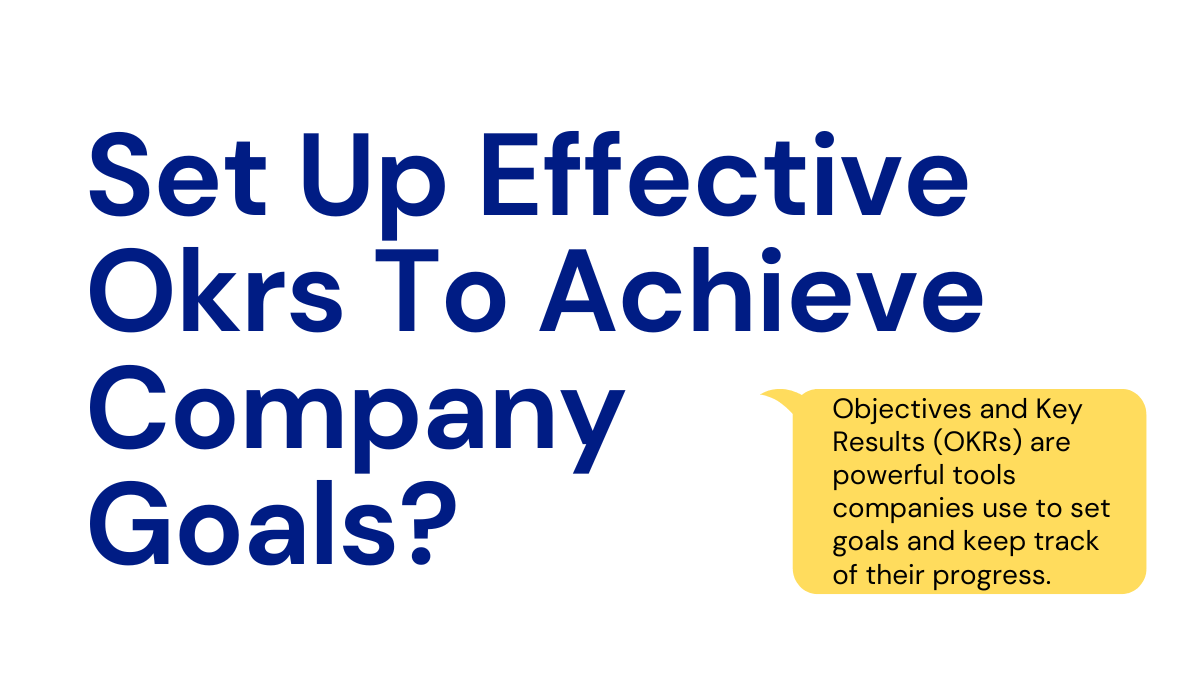
Set up effective OKRs to achieve company goals?
Objectives and Key Results (OKRs) are powerful tools companies use to set goals and keep track of their progress. In this article, we’ll discuss how to set up effective OKRs to ensure that your organization achieves its desired outcome and stays on track.
What is OKR, and why does it matter?
An OKR, or Objectives and Key Results, is a performance management system that provides a framework for setting measurable goals and tracking progress.
Companies like Google and Intel have used OKRs to achieve success, and more recently, OKRs have been gaining popularity as a tool for startups and small businesses.
There are a few key reasons why OKRs matter:
- They help to ensure that everyone in the company is aligned to work towards the same goals.
- They help to hold individuals and teams accountable for results.
- They provide transparency into what everyone is working on and how they contribute to the company’s success.
- They help to create a culture of focus and excellence.
- They can be adapted to changing circumstances and priorities over time.
If you’re thinking of implementing OKRs in your business, it’s important to remember these reasons. If you need further guidance on OKR, you can look online for the consultants, such as https://okrquickstart.com.
How to set up effective OKRs
Setting up effective OKRs can seem daunting, but it doesn’t have to be. By following these simple steps, you can ensure that your OKRs are aligned with your company’s goals and help everyone in your organization stay focused on what’s important.
- Define what you want to achieve.
Start by clearly defining what you want to achieve with your OKRs. What are your company’s top priorities? What are the most important things that need to be accomplished to reach those goals? Once you understand what you’re trying to achieve, you can start setting up your OKRs.
- Align your OKRs with your company’s goals.
Make sure that your OKRs are aligned with your company’s overall goals. Every objective and key result should support the achievement of one or more company objectives. This will help ensure that everyone in your organization is working towards the same goal and avoid duplication of effort.
- Set realistic and achievable objectives and key results.
It’s important to set realistic objectives and key results that can actually be achieved within your set time frame. There’s no value in setting an objective that is impossible to reach or setting a key result that is not directly related to the objective. Be specific, measurable, and achievable when setting up your OKRs.
- Communicate your OKRs throughout the organization.
Once you’ve set up your OKRs, it’s important to communicate them throughout the organization. Make sure everyone is aware of the objectives and key results and understands their role in achieving them. This will help ensure that everyone is working towards the same goal and can stay focused on what’s important.
- Track progress regularly.
Finally, tracking progress regularly is important to ensure your OKRs are being met. You should review progress regularly and make sure that any changes that need to be made are done in a timely manner. This will help ensure that your OKRs remain aligned with your company’s goals and that everyone stays focused on what’s important.
Challenges with OKR implementation
There are a few challenges that can come up when implementing OKRs. The first challenge is getting buy-in from everyone in the company. It’s essential to get everyone on board with the new system and to understand how it will work. Otherwise, there will be confusion and frustration.
Another challenge is setting realistic goals. It’s crucial to set goals that are achievable, and that will stretch the team. If the goals are too easy, then there’s no point in having them. If they’re too hard, then people will get discouraged and give up.
The last challenge is maintaining momentum. Once the initial excitement of setting up OKRs wears off, it can be difficult to keep people motivated. So it’s important to keep reminding people of the benefits of OKRs and why they’re important for the company.
Summary
Setting up effective OKRs is essential to achieving your company goals. With well-thought-out objectives, key results, and processes in place, organizations can create a roadmap of success that will lead them to their desired outcomes.






